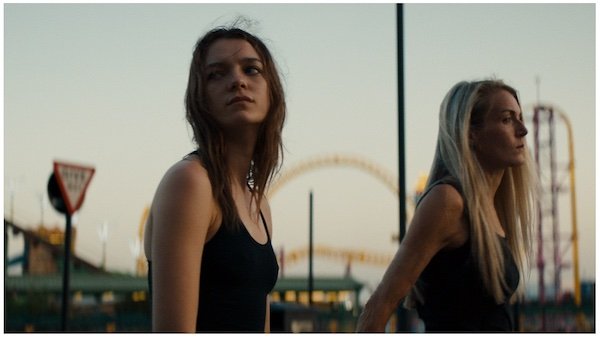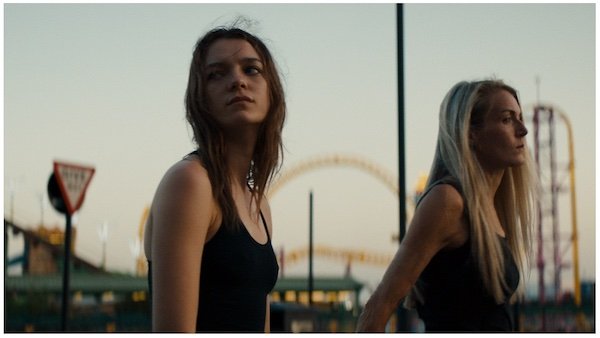By Tim Jackson
Silver Haze, directed by Sacha Polack. Available on VOD
Walking a fine line between fiction and documentary, director Sacha Polak has fashioned a film that is achingly real because it evokes life’s unpredictability.

A scene featuring Esmé Creed-Miles and Vicki Knight in Silver Haze. Photo: Viking Film
Dutch director Sacha Polak’s Silver Haze moves in fits and starts, rambling through its story with a plot that befits the cobbled together milieu of British working-class life. Its protagonist is Franky, an angry woman traumatized by burns she suffered as a child. The result of a careless house fire, she harbors resentment toward her father for the scars that mark her arm and face. She lives in a crowded home in Dagenham, East London, with her sister and her unstable, substance abusing mother (her dad is long gone). While maintaining a career as a nurse, she meets Florence, a suicide survivor: two begin a passionate love affair. She moves into a house run by Florence’s grandmother, Alice, who lives with Franky’s autistic brother, Jack. Alice, who is suffering from terminal cancer, clings to an optimism that holds everyone together.
Despite this mostly stable home situation, the women’s love affair is messy. Florence vacillates between affection and abuse and this wavering is representative of a film whose plot is a confusion of complications. Those looking for easy answers or a concise wrap-up will be frustrated. Still, as it probes the emotional lives of its characters, Silver Blaze comes across as straightforward and honest as a narrative film can be. That might be because Silver Haze was inspired by conversations with actress Vicki Knight about her life story. The actress’s physical scars are real; she worked with Polak in 2019 on his film Dirty God, which is also about a woman coming to terms with her burn scars. Accented by her long blond hair and energized by a confident vulnerability, Knight’s beauty transcends her handicap. The authenticity of the actress’s performance — a reflection of lived experience — is striking. Knight may be rail thin — with scars covering her arm and neck — but she doesn’t shy away from bold displays of physicality. Franky’s sister is played by Charlotte Knight, her actual sister. Although there was a script, the director has said that improvisations ended up driving the most powerful scenes. Walking a fine line between fiction and documentary, Polak has fashioned a film that is achingly real because it evokes life’s unpredictability
Two professional actors occupy other leading roles. Esmé Creed-Miles, who worked with the director on a Paramount series called The Doll Factory, plays Florence, whose personality vacillates between passion and anger. Each actress holds her own in scenes that range from tender lovemaking to raw confrontations: despite the difference in acting experience the two are evenly matched. This is a bold experiment that pays off. An veteran British actress of West Indian descent, Angela Bruce gives a commanding performance as the terminally ill grandmother. Her character’s calm and unruffled demeanor in the face of formidable domestic challenges: an autistic brother, manic granddaughter, and her own terminal illness, puts the problems of others into proper perspective. Bruce is the film’s heart, which is ultimately a celebration of family and hope.
Silver Haze is a film that self-consciously follows in the tradition of British realism. Its major film practitioners have been Mike Leigh (Naked, Secrets and Lies) and Ken Loach (Kes, The Old Oak); more recently, Lynn Ramsey (Ratcatcher) and Steve McQueen (Small Ax) have been influenced by the genre’s conventions. John Osborne’s 1956 play Look Back in Anger was the model; its controversial success set off a series of “kitchen-sink” dramas in both theater and film. These were often stories of impoverished, frustrated, working-class lives proscribed by pubs and cramped flats. Director Tony Richardson, one the movement’s pioneers, once described these films as being “about the world we are living in, films that are part of that world . . . the sort of thing that film does best”.
Polak has created a remarkable document that reflects the realities of proletarian British life. The title, Silver Haze, was partly inspired by the dreary weather the dominates the part of England where the film is set. It is a strain of marijuana as well, which might suggest that, amid the haze of uncertainty regarding the future, is it possible to glimpse a silver lining of optimism and resilience.
It should be mentioned that, following her remarkable performance, actress Vicki Knight went back to work as a healthcare assistant at Broomfield Hospital in Essex, England.
Tim Jackson was an assistant professor of Digital Film and Video for 20 years. His music career in Boston began in the 1970s and includes some 20 groups, recordings, national and international tours, and contributions to film soundtracks. He studied theater and English as an undergraduate, and has also worked helter skelter as an actor and member of SAG and AFTRA since the 1980s. He has directed three feature documentaries: Chaos and Order: Making American Theater about the American Repertory Theater; Radical Jesters, which profiles the practices of 11 interventionist artists and agit-prop performance groups; When Things Go Wrong: The Robin Lane Story. And two short films: Joan Walsh Anglund: Life in Story and Poem and The American Gurner. He is a member of the Boston Society of Film Critics. You can read more of his work on his blog.

